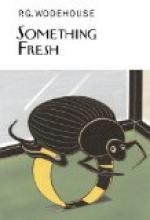“What do people do with themselves in a place like this? When they want amusement, I mean. I suppose it’s different if you’ve been brought up to it. Like being born color-blind or something. You don’t notice. It’s the visitor who suffers. They’ve no enterprise in this sort of place. There’s a bit of land just outside here that would make a sweet steeplechase course; natural barriers; everything. It hasn’t occurred to ’em to do anything with it. It makes you despair of your species—that sort of thing. Now if I—”
Baxter dozed. With his fork still impaling a piece of cold beef, he dropped into that half-awake, half-asleep state which is Nature’s daytime substitute for the true slumber of the night. The fat man, either not noticing or not caring, talked on. His voice was a steady drone, lulling Baxter to rest.
Suddenly there was a break. Baxter sat up, blinking. He had a curious impression that his companion had said “Hello, Freddie!” and that the door had just opened and closed.
“Eh?” he said.
“Yes?” said the fat man.
“What did you say?”
“I was speaking of—”
“I thought you said, ‘Hello, Freddie!’”
His companion eyed him indulgently.
“I thought you were dropping off when I looked at you. You’ve been dreaming. What should I say, ‘Hello, Freddie!’ for?”
The conundrum was unanswerable. Baxter did not attempt to answer it. But there remained at the back of his mind a quaint idea that he had caught sight, as he woke, of the Honorable Frederick Threepwood, his face warningly contorted, vanishing through the doorway. Yet what could the Honorable Freddie be doing at the Emsworth Arms?
A solution of the difficulty occurred to him: he had dreamed he had seen Freddie and that had suggested the words which, reason pointed out, his companion could hardly have spoken. Even if the Honorable Freddie should enter the room, this fat man, who was apparently a drummer of some kind, would certainly not know who he was, nor would he address him so familiarly.
Yes, that must be the explanation. After all, the quaintest things happened in dreams. Last night, when he had fallen asleep in his chair, he had dreamed that he was sitting in a glass case in the museum, making faces at Lord Emsworth, Mr. Peters, and Beach, the butler, who were trying to steal him, under the impression that he was a scarab of the reign of Cheops of the Fourth Dynasty—a thing he would never have done when awake. Yes; he must certainly have been dreaming.
In the bedroom into which he had dashed to hide himself, on discovering that the dining-room was in possession of the Efficient Baxter, the Honorable Freddie sat on a rickety chair, scowling. He elaborated a favorite dictum of his:
“You can’t take a step anywhere without stumbling over that damn feller, Baxter!”
He wondered whether Baxter had seen him. He wondered whether Baxter had recognized him. He wondered whether Baxter had heard R. Jones say, “Hello, Freddie!”




